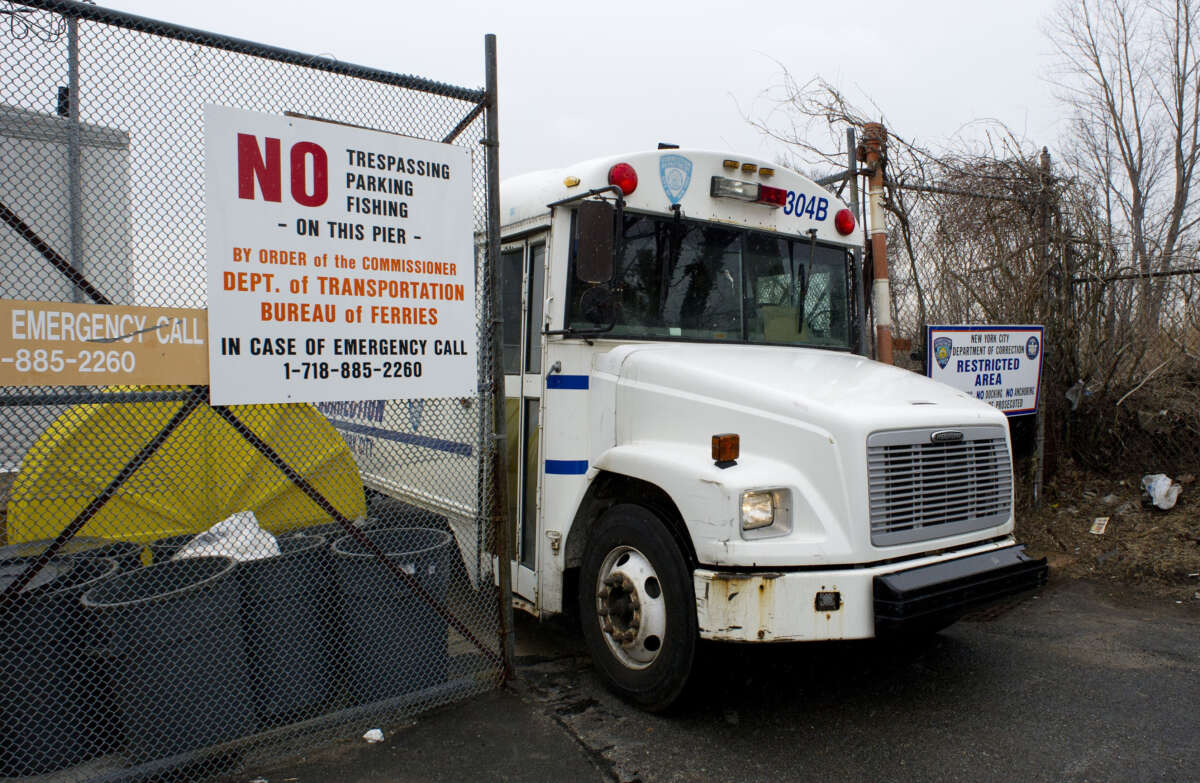Did you know that Truthout is a nonprofit and independently funded by readers like you? If you value what we do, please support our work with a donation.
On Tuesday, a federal judge temporarily blocked the White House from transferring three transgender women to men’s prisons and denying them gender-affirming health care in compliance with President Donald Trump’s recent executive order.
“Once again, Trump’s executive orders are blocked by judges based on their questionable legality,” LGBTQ legislative researcher Allison Chapman told Truthout. “I can’t imagine the relief felt by these incarcerated transgender individuals upon hearing that they will no longer be forcibly detransitioned.”
The order — one of many anti-trans measures Trump has implemented since taking office — requires the federal government to recognize only two sexes, male and female. It also directs the Bureau of Prisons (BOP) to house incarcerated people according to this definition, bans federal funding for gender-affirming care for those in custody, and overrides protections under the Prison Rape Elimination Act (PREA) for vulnerable populations, including transgender women.
The plaintiffs, identified by pseudonyms in court filings, are represented by attorneys from the National Center for Lesbian Rights and GLBTQ Legal Advocates & Defenders (GLAD). Until January, they had been housed in women’s units, but were recently removed from the general population and placed in segregation with other transgender women while awaiting transfer to men’s facilities.
U.S. District Judge Royce Lamberth, a Reagan appointee, granted their request for a temporary restraining order just hours after a hearing in which a plaintiffs’ attorney argued that the placement of transgender women in men’s prisons subjects them to a substantial risk of violence and sexual assault, constituting cruel and unusual punishment in violation of the Eighth Amendment.
“They were terrified at the prospect of these transfers given the serious risk of violence and sexual assault that they face in these men’s facilities,” Jennifer Levi, an attorney with GLAD, told the judge.
“There is no way to keep these women safe outside of a women’s prison,” Levi continued. “We are just asking this court to maintain the status quo.”
Lamberth’s ruling extends further than a January 26 decision by a federal judge in Massachusetts which applied to a single transgender woman in a women’s prison. Instead, Lamberth’s order prevents officials from “implementing” the contested provisions while the case moves forward.
In his ruling, Lamberth noted that the government did not dispute the plaintiffs’ claim that transgender people face a heightened risk of physical and sexual violence when confined in prisons that align with their assigned sex at birth. He also pointed out that only about 16 transgender women are currently housed in women’s prisons, including the three plaintiffs in this case, which challenges the state’s claim that allowing transgender women in women’s facilities has some “deleterious effect on privacy and security.”
“And it is hard to cognize of any public interest in the immediate cessation of their hormone therapy — aside, perhaps, from whatever small sum of money the BOP may save by ceasing administration of these drugs, or the abstract interest in the enforcement of Executive branch policy decisions,” Lamberth wrote in the order. “The plaintiffs’ interests, on the other hand, are not abstract at all.”
Despite Lamberth ruling that the incarcerated transgender women have “demonstrated that irreparable harm will follow if their [temporary restraining order] request is denied,” documents newly obtained by NPR show that a new BOP policy will further erode their rights and protections. The policy mandates that transgender women in federal prisons surrender female-identifying clothing and commissary items, including women’s razors and hair care products.
The policy also eliminates trainings that “inculcate or promote gender ideology or have done so in the past” and shuts down group programs that “promote gender ideology,” which may include support and group therapy. Additionally, it removes the “transgender visual and pat search exception,” which had allowed incarcerated transgender people to request a guard who matches their gender identity — a protection that helped reduce the risk of sexual assault and other forms of violence. It remains unclear how Lamberth’s order will impact this policy.
Kara Janssen, an attorney representing the three transgender women challenging Trump’s anti-trans executive order, told NPR that the new BOP policy not only violates multiple federal laws, including PREA, but is also “mean and spiteful.”
“It’s stripping away their identities,” Janssen said. “It’s going to create less safe environments for everybody.”
A terrifying moment. We appeal for your support.
In the last weeks, we have witnessed an authoritarian assault on communities in Minnesota and across the nation.
The need for truthful, grassroots reporting is urgent at this cataclysmic historical moment. Yet, Trump-aligned billionaires and other allies have taken over many legacy media outlets — the culmination of a decades-long campaign to place control of the narrative into the hands of the political right.
We refuse to let Trump’s blatant propaganda machine go unchecked. Untethered to corporate ownership or advertisers, Truthout remains fearless in our reporting and our determination to use journalism as a tool for justice.
But we need your help just to fund our basic expenses. Over 80 percent of Truthout’s funding comes from small individual donations from our community of readers, and over a third of our total budget is supported by recurring monthly donors.
Truthout has launched a fundraiser to add 500 new monthly donors in the next 10 days. Whether you can make a small monthly donation or a larger one-time gift, Truthout only works with your support.
